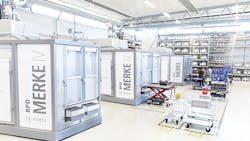Norsk Titanium AS has a contract from The Boeing Co. to supply 3D-printed, titanium engineering test articles for commercial aircraft structural components, though details of the contract are few. The value and timing of the articles to be delivered are not known. Norsk Titanium (NTi) will produce titanium Ti-6Al-4V preforms, and delivering them to Boeing for further testing and evaluation. Their project is intended to demonstrate part-to-part repeatability and to optimize the operations processes necessary to enter into long-term production of structural components for fleet aircraft, according to NTi
“We are pleased with Boeing’s thoughtful review of structural titanium components made by our RPD process,” stated Norsk Titanium president and CEO Warren M. Boley, Jr. “Together, we seek to create significant customer value by reducing cost and lead-time from their premier commercial airplane platforms.”
NTi produces aerospace-grade titanium structures at Hønefoss, Norway. The company’s U.S. subsidiary is building an industrial-scale metal additive-manufacturing plant at the SUNY Polytechnic Institute in Plattsburgh, NY, scheduled to start in late 2017. New York State has invested $125 million in the project,
The Plattsburgh plant initially will house 20 NTi-patented, MERKE IV™ Rapid Plasma Deposition™ (RPD) process machines, capable of producing 400 metric tons/year of aerospace structural parts, though NTi’s plans call for the plant eventually to have twice as many machines and a capacity of 800 metric tons/year.
The proprietary process involves feeding titanium wire into a set of plasma torches cooled by an argon shield, melting the material into a near-net shape according to a CAD-determined design. NTi claims that the process makes it possible to produce parts that will replace parts currently made by forging, with shorter development and production time. According to a statement, NTi “has signed numerous contracts with the top echelon of aerospace manufacturers and tier-1 suppliers interested in leveraging RPD™ to cut cost and lead time from airframe and engine programs.”
Last year, NTi’s RPD technology was used by an Airbus subsidiary, Premium Aerotech, to produce structural components in titanium Ti64 for the A350 XWB wide-body aircraft. Those parts were finish-machined “with excellent results,” in what was described then as the first step in a joint-qualification program for additive-manufactured titanium aircraft components.
It’s not known which Boeing aircraft program will receive the additive-manufactured titanium parts. Boeing has numerous programs that involve different titanium structural parts, or for which titanium may provide new weight reductions, in current production and in development.
“Although it is still early in the qualification process, we are pleased with the steady progress, including evaluations of our MERKE IV™ production machine, as well as this latest test article order,” offered Norsk Titanium chief commercial officer Chet Fuller. “This activity follows evaluations of the MERKE III production machine, qualified under the Boeing Material Specification, back in February.”
About the Author
Robert Brooks
Content Director
Robert Brooks has been a business-to-business reporter, writer, editor, and columnist for more than 20 years, specializing in the primary metal and basic manufacturing industries. His work has covered a wide range of topics, including process technology, resource development, material selection, product design, workforce development, and industrial market strategies, among others.
